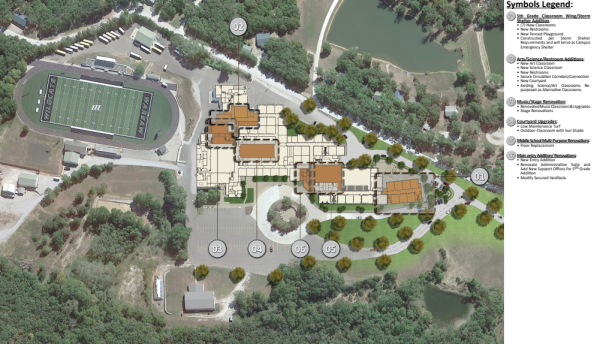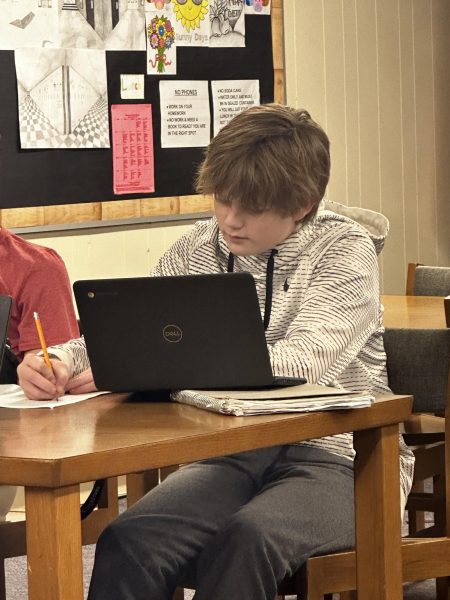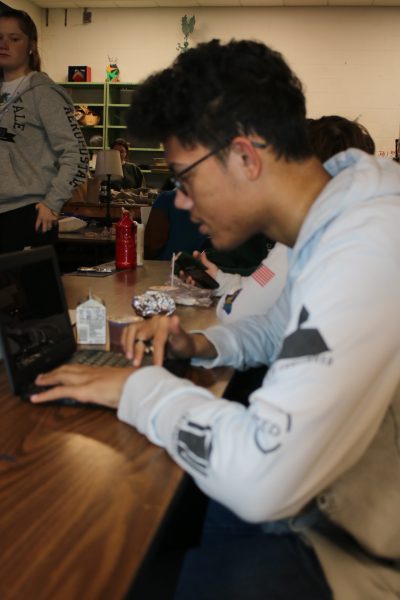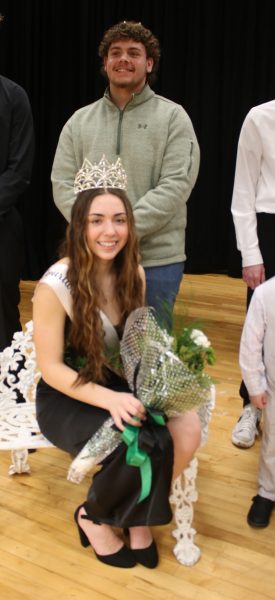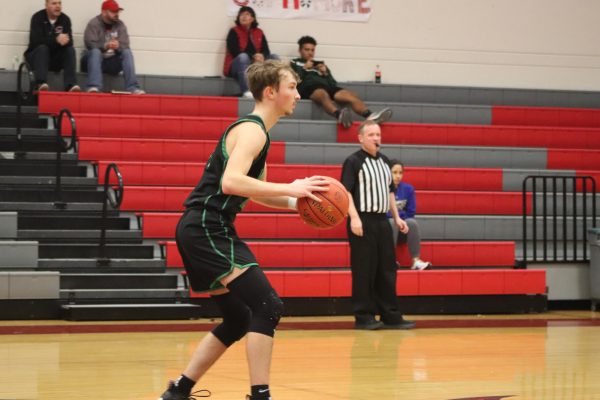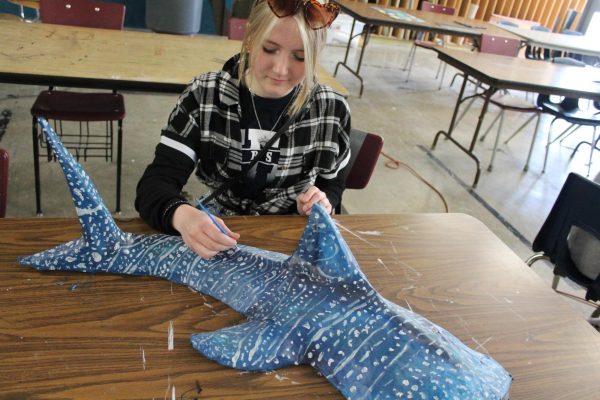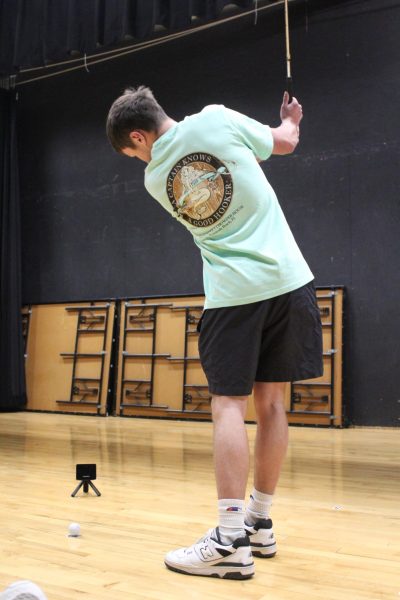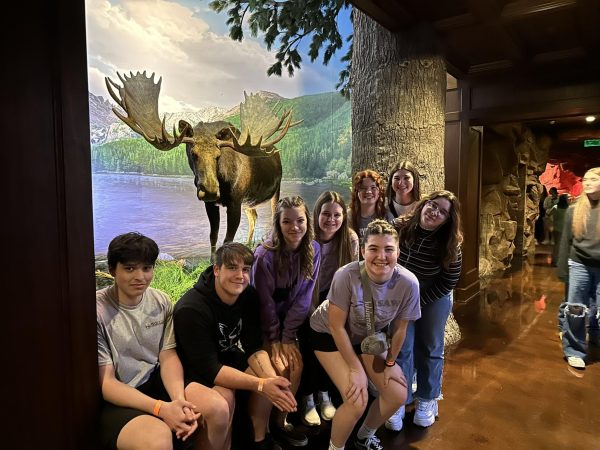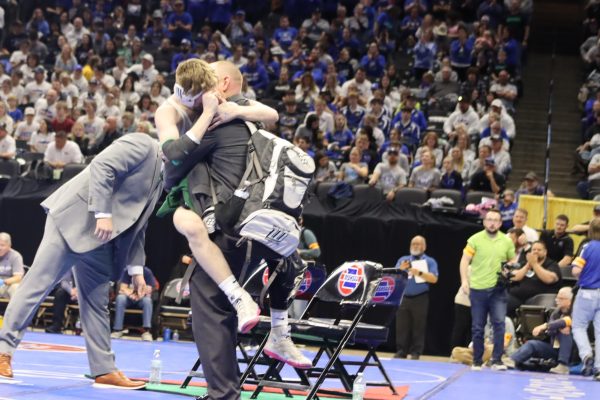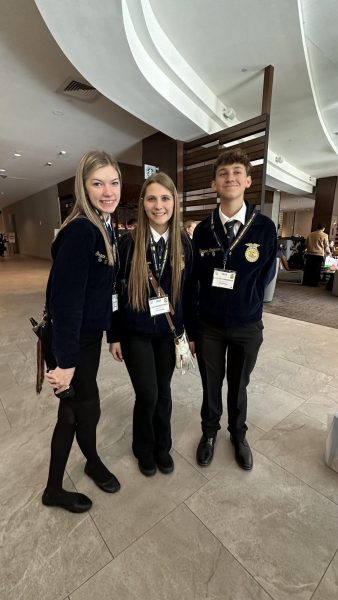Lack of positive school culture inspires “We Are Family” assembly
The day was just like every other day, and the assembly had begun just like every other assembly. Students poured into the gym and sat on the visitor side, dismissing what they perceived to be another boring assembly about bullying. They had been used to strangers standing on stage and speaking – that is, up until Nov. 20.
The assembly began with girls being separated from boys. They were sent to the football field, where the privilege race began. Math and career development teacher Jowell Roellig, who lead the assembly, would call out scenarios. If the scenario applied to the student, they could take a step forward. The scenarios were based on circumstantial privileges – questions such as “If you have never had to worry where your next meal came from,” or “If both of your parents are still married.” At the end, all of the students sprinted from their spot to vie for a $25 gift card. The point of this exercise was to teach students that life isn’t fair, but putting forth hard work can still get a person to the finish line. The activity also emphasized empathy and understanding for others.
“The lesson I walked away from this with is that not everyone has a life like I do and to think before I speak,” junior Paul Landsberg said. “If I could change anything (about the assembly) it would be the part where people said their problems in life. I feel like that’s personal information.”
After the race, students were moved into the music room for another activity in which Roellig would read statements, and if that statement applied, the student would move to the middle. Some of the statements included: “Has your parent ever been in prison or is currently in prison?” “Have you ever thought of suicide?” “Have you ever felt alone?” The point of this exercise was to make students feel included, and realize that they are not alone in their personal struggles. Following this was a session in which students were encouraged to voice their personal thoughts and stories in the middle of the circle.
Senior Jake Luebbert believes the opposite of Landsburg – that the indoor activity was more successful than the outdoor.
“My favorite part of the assembly was allowing people to get stuff off their chest, I came away from the assembly knowing that a lot of people go through stuff,” Luebbert said. “If I could have changed something it would be to get rid of the whole life race thing, because it brought down the rest fo the assembly. I would not have another assembly similar to this because it would be pointless as the shock factor that helped drive the point of the assembly is gone.”
“The lesson I walked away with is that not everyone is going to have the same advantages, but it’s your life and that doesn’t mean you are any less equal,” senior Suzy Cortright said. “Everyone could feel vulnerable if they wanted to – it wasn’t mandatory. We were allowed to open up if we truly needed to and sometimes, I think – as people – we need that. It was truly neat to have an assembly as raw and genuine as it was.”
Some students, however, felt as if the message being conveyed wasn’t synonymous to the intended lesson.
“I went into the assembly already knowing that other people struggle and that we all go through hard times. I would have changed the aspect of the privilege race. When they asked the people at the front to turn around – I know exactly what they were trying to do, and it could have been really good – but it seemed like they were singling us out. I was pretty far back and when I looked behind me, the students were ashamed and had sad looks on their faces. I didn’t like that,” junior Lily Asplaugh said. “Bullying now of days isn’t about the kind of things that were discussed in the privilege race. It’s usually over some drama, not about your home life.”
“People are still going to bully, anyways,” senior Dayvon Bruce said. “I didn’t like how we had to stand in the middle for the circle thing. Like, why are you asking us to do that? What does it have to do with bullying? I don’t really agree with it.”
However, Roellig has put an emphasis on the fact that the assembly was over much more than just bullying and that, in fact, bullying wasn’t even the intended theme. Weeks prior, she had begun her planning, initially getting the inspiration for it during a leadership meeting with administration and teachers. During the meeting, teachers and administration volleyed ideas on how to make students feel like they belong.
“There’s not a huge bullying problem. I feel like there’s a problem with people feeling like they don’t belong here, or that they’re not liked, and I think that’s not true. Every meeting Mr. Morrison has with the faculty or the leadership, he’s always instructing us to build relationships with our students.” Roellig said. “Mrs. Boyer came up with the idea for the football field. It really wasn’t for the kids who had a stable home life, it was for the kids who have an unstable home life. We wanted to tell them that they didn’t do anything to create that environment, just as well as the kids that were up towards the goal posts. It’s not fair, life is not fair, but we care about you, and you can still get to the end by working hard.”
While initially Roellig met with students to select a few teachers to help out and participate in the assembly, she eventually extended the invitation to the whole staff. Counselor Tyler Richardson was glad to participate in something that would help the school’s culture.
“The most touching moment for me was those individuals who came to the front of the group and talked about certain things that were bothering them. I thought it was pretty cool that some students realized that they had bullied in the past and they did come forward and state that and apologize in front of the whole group. The amount of courage that takes to admit in front of the entire student body is cool and I’m glad they did that,“ Richardson said. “I think the assembly was eye-opening for both parties. I know the event that took place on the field may have resulted in a few people being frustrated that they were at a disadvantage. I think the people who knew they were disadvantaged already knew that, but I think that the people who had all of the advantages had a large impact on them when they were able to turn around and see the vast difference in all the people. It was a team-building situation that would help people understand where others come from.”
Following the assembly, Richardson created a new bully report form and shared it via email in hopes that it would help make students feel more comfortable.
“Students can pull it up from the comfort of their home, or on a device at school where nobody knows that they are reporting. Hopefully, that will create an opportunity for students who report bullying so that they can be investigated and help curb any future bullying,” Richardson said.
Roellig plans on hosting future assemblies that go beyond the previously covered topics. Roellig finds that the source of Warsaw High’s poor school culture could be due to phones, and would like to bring an awareness to that fact.
“I think technology – their phones and social media – have made students so closed off to building relationships. They don’t know how to do that, they don’t know how to talk face to face. They do everything through a snap or a text message or a post. They don’t know how to have that back and forth communication feedback,” Roellig said. “I think the thing we are dealing with right now, as teachers, is the complacency. The ‘I don’t cares,’ ‘Nothing matters.’ That was very evident in some of the boys during the race.”
Roellig is also worried about the response she received at the question, “have you ever thought of suicide?” She first brought this matter to light in her Career Development class, in which every student answered yes.
“The circle activity was just to make students feel included, because I know in our career development class – when we did our little activity – the one that blew me away that still makes my heart hurt was ‘have you ever thought of suicide?’ Every single student stood up. That just blew me away and still does to this day,” Roellig said. “These guys were the best of the best, and if we still have this, then we need to come together and quit bickering over our differences. We are family. We are Warsaw High School family.”
Roellig is aware of the backlash and controversy this assembly has inspired, but is willing to endure more if it means helping the students.
“It would be so much easier for me to do nothing, because that way I wouldn’t get backlash. But if we don’t do it now, it’s not ever going to happen. We had the best intentions,” Roellig said. “Could we have done something differently in hindsight? Yes. But you’re also dealing with four hundred different opinions and four hundred different ideas. I can retire in two years and walk away, but I want to make things better. I don’t know what the answer is – I think just trying to do something means everything.”

Ally Estes is a senior with a passion for the liberal arts. She currently attends Warsaw High but plans on attending Graceland University in Iowa,...



